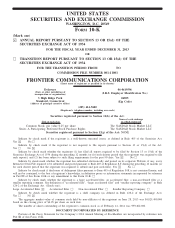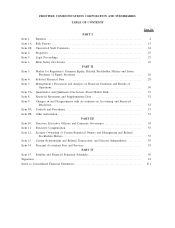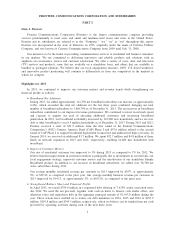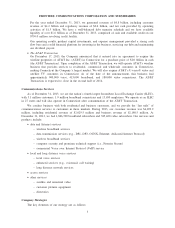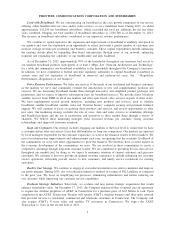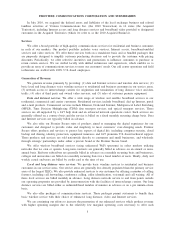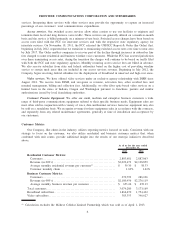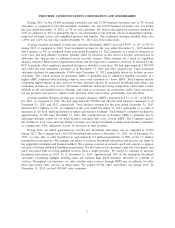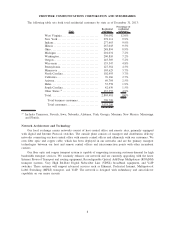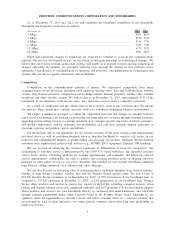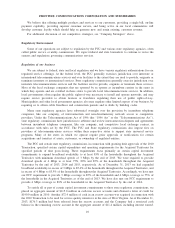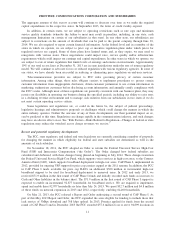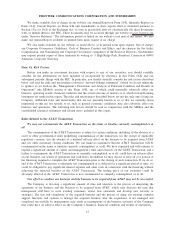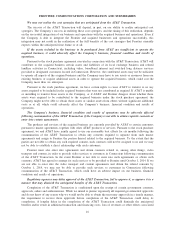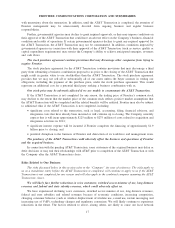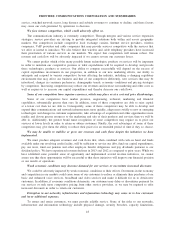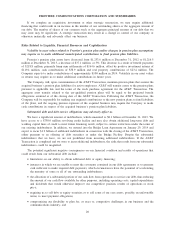Frontier Communications 2013 Annual Report Download - page 11
Download and view the complete annual report
Please find page 11 of the 2013 Frontier Communications annual report below. You can navigate through the pages in the report by either clicking on the pages listed below, or by using the keyword search tool below to find specific information within the annual report.We believe that offering multiple products and services to our customers, providing a single bill, on-line
payment capability, providing superior customer service, and being active in our local communities will
develop customer loyalty which should help us generate new, and retain existing, customer revenue.
For additional discussion of our competitive strategies, see “Company Strategies” above.
Regulatory Environment
Some of our operations are subject to regulation by the FCC and various state regulatory agencies, often
called public service or utility commissions. We expect federal and state lawmakers to continue to revise the
statutes and regulations governing communications services.
Regulation of our business
We are subject to federal, state and local regulation and we have various regulatory authorizations for our
regulated service offerings. At the federal level, the FCC generally exercises jurisdiction over interstate or
international telecommunications services and over facilities to the extent they are used to provide, originate or
terminate interstate or international services. State regulatory commissions generally exercise jurisdiction over
intrastate telecommunications services and the facilities used to provide, originate or terminate those services.
Most of the local exchange companies that are operated by us operate as incumbent carriers in the states in
which they operate and are certified in those states to provide local telecommunications services. In addition,
local governments often regulate the public rights-of-way necessary to install and operate networks, and may
require service providers to obtain licenses or franchises regulating their use of public rights-of-way.
Municipalities and other local government agencies also may regulate other limited aspects of our business, by
requiring us to obtain cable franchises and construction permits and to abide by building codes.
Many state regulatory agencies have substantial oversight over the provision by incumbent telephone
companies, like our company, of interconnection and non-discriminatory network access to competitive
providers. Under the Telecommunications Act of 1996 (the “1996 Act” or the “Telecommunications Act”),
state regulatory commissions have jurisdiction to arbitrate and review interconnection disputes and agreements
between incumbent telephone companies, like our company, and competitive local exchange carriers, in
accordance with rules set by the FCC. The FCC and State regulatory commissions also impose fees on
providers of telecommunications services within their respective states to support state universal service
programs. Many of the states in which we operate require prior approvals or notifications for certain
acquisitions and transfers of assets, customers, or ownership of regulated entities.
The FCC and certain state regulatory commissions, in connection with granting their approvals of the 2010
Transaction, specified certain capital expenditure and operating requirements for the Acquired Territories for
specified periods of time post-closing. These requirements focus primarily on certain capital investment
commitments to expand broadband availability to at least 85% of the households throughout the Acquired
Territories with minimum download speeds of 3 Mbps by the end of 2013. We were required to provide
download speeds of 4 Mbps to at least 75%, 80% and 85% of the households throughout the Acquired
Territories by the end of 2013, 2014 and 2015, respectively. As of December 31, 2013 we had expanded
broadband availability in excess of 3 Mbps to 85.4% of the households throughout the Acquired Territories, and
in excess of 4 Mbps to 83.5% of the households throughout the Acquired Territories. Accordingly, we have met
our FCC requirement to provide 3 Mbps coverage to 85% of the households and 4 Mbps coverage to 75% of
the households in the Acquired Territories as of the end of 2013. We have also met our FCC requirement to
provide 4 Mbps coverage to 80% of the households in the Acquired Territories by the end of 2014.
To satisfy all or part of certain capital investment commitments to three state regulatory commissions, we
placed an aggregate amount of $115.0 million in cash into escrow accounts and obtained a letter of credit for
$190.0 million in 2010. Another $72.4 million of cash in an escrow account was acquired in connection with
the 2010 Transaction to be used for service quality initiatives in the state of West Virginia. As of December 31,
2013, $176.3 million had been released from the escrow accounts and the Company had a restricted cash
balance in the remaining escrow account in the aggregate amount of $11.4 million, including interest earned.
10
FRONTIER COMMUNICATIONS CORPORATION AND SUBSIDIARIES

